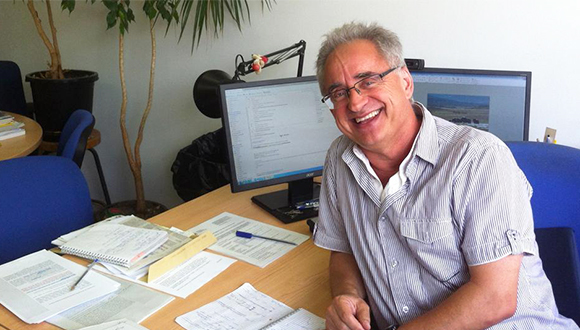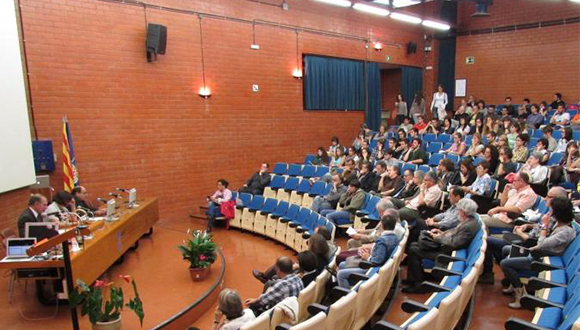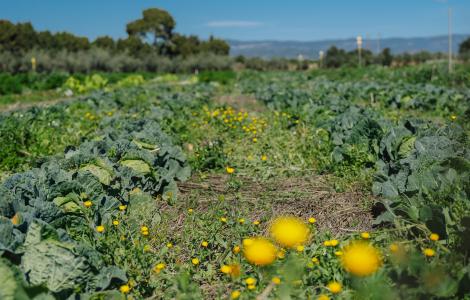Peñuelas, awarded with Margalef Prize
In the prizes to the trajectory of a scientist, people say , the hardest is to begin, because after the first award, the winner can be pretty sure that others will come. Maybe, but there are different categories of prizes. Josep Peñuelas is starting to get the big ones, those that he deserves by his contributions to ecology, his dedication and his ability to empathize in order to establish fruitful relationships with scientists all around the world.

He had already received awards from NASA and the Japan’s Ministry of Science. Six years ago, in 2010, he was given the I Premi de Recerca de Catalunya, last year the Premio Jaime I of Valencia, recently a doctorate honoris causa. And now... it has been the Ramon Margalef Prize. It's the first Catalan scientist, and the first in Spain, to receive this distinction, which in economic terms is the second most important given by the Generalitat, after the Catalonia Award, although somewhat lower than Premio Jaime I.
Josep was some years a member of Margalef Prize’ Jury. This year, his name, proposed by the president of the CSIC, has been unanimously chosen by the current international jury (only the president, Joandomènec Ros, is Catalan, the others have been Sally Chisholm - MIT of Massachusetts-, Wolfgang Cramer - Aix-en-Provence-, John Grace -Edimburg-, Nancy Grimm -Arizona-, Beatriz Reguera -Vigo-, and Maurizio Ribera -Napoli-). If we remember the previous awarded ecologists, the names are well-known: Paul Dayton, John Lawton, Harold A. Mooney, Daniel Pauly, Paul R. Ehrlich, Simon A. Levin, Juan Carlos Castilla, Daniel Simberloff, Sally W. Chisholm, David Tilman, Robert Ricklefs. An English, a French-Swiss, a Chilean, the rest of them from the United States. Peñuelas is the twelfth ecologist who receives this award.
Peñuelas is also the first direct disciple of Margalef that has been awarded. I am sure that he is still more proud for this award named to honour his teacher. Of course, also for the CSIC and the CREAF the prize should be a source of great satisfaction. For CREAF, it is another contribution that Josep Peñuelas makes to the prestige of the centre, and there are already many of them. The constant improvement in rankings that measure the quality of the research centres is greatly due to the Josep and his collaborators impressive production. Forget that I am in his group of global change, my contribution is very small, but I have had the pleasure of making some papers with Josep and so I am a direct witness of his abilities.

I know Josep since he was making his thesis about the ecology of mosses that live in fresh waters, and occasionally he came to talk with C. Casas about the species he found. I remember how he leaved the department of ecology of the University of Barcelona and went to IRTA (he wanted more time for research) and then to CREAF and CSIC. At CREAF, we simply won the lottery, and I hope he has also liked to stay with us. Margalef sometimes complained that the best leaved him, and certainly one of those was Josep Peñuelas.
Awards, this is sure, will not change the Peñuelas friendly and easy mood, nor his desire to continue working, because that's what he does and that's as he has fun. Therefore, it’s time to congratulate him and congratulate us for having him as a companion.
And now let me tell you one thing. When Margalef died, I wrote to Science and Nature telling them who was Margalef, the awards he had received, and asking them to publish an obituary article. I think I had no response from Science, and Nature told me that they were sorry but he was not an enough known figure (or maybe it happened in the other way, it doesn’t matter). Only by being awarded with Huntsman prize for oceanography I think that Margalef might deserve a mention, but he had not. The truth is what makes a scientist to become largely recognized —apart from doing not science but management, or become president of international commissions, etc.— is often to have made a relevant particular finding. This can happen in chemistry, physics or biomedicine, but it is less probable in sciences such as oceanography and ecology. Maybe that is why there are no Nobel prizes of these specialties (it is curious that once the Nobel was awarded to three ethologists). In this sense, I found very positive that the Generalitat Government continues to support the Prize Ramon Margalef, because if Margalef was not "sufficiently known" by those who were not ecologists and oceanographers during his life, and now his work is no longer widely read (Narcís Prat showed this by analysing the citations numbers in an article in Ecosistemas last year), the name of the prize and the prestige it receives from the winners helps to keep alive the name of Margalef among scholars of ecological systems. Perhaps this will allow some young people to rediscover Margalef in the future. I think it would be good for ecology.
A disciple as Josep Peñuelas also helps to the memory of his great predecessor.







